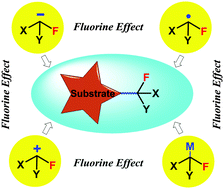The unique fluorine effects in organic reactions: recent facts and insights into fluoroalkylations
Abstract
Fluoroalkylation reaction, featuring the transfer of a fluoroalkyl group to a substrate, is a straightforward and efficient method for the synthesis of organofluorine compounds. In fluoroalkylation reactions, fluorine substitution can dramatically influence the chemical outcome. On the one hand, the chemistry of alkylation with non-fluorinated reagents may not be applicable to fluoroalkylations, so it is necessary to tackle the fluorine effects to achieve efficient fluoroalkylation reactions. On the other hand, fluorine substitution may bring about new reactivities and transformations that cannot be realized in alkylation with non-fluorinated reagents; thus, fluorine substitution can be used to explore new synthetic methods. This tutorial review provides a brief overview of the unique fluorine effects in recently developed nucleophilic, electrophilic, radical, and transition metal-mediated fluoroalkylation reactions by comparing with either their non-fluorinated counterparts or fluorinated counterparts with different numbers of fluorine substituents.


 Please wait while we load your content...
Please wait while we load your content...